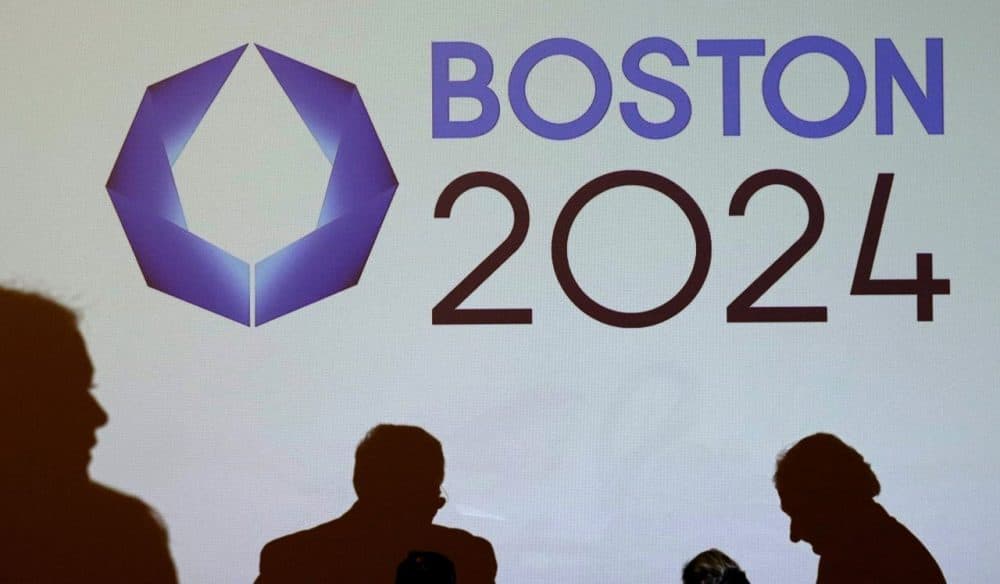Advertisement
How Boston's Olympic Bid Unraveled In The Final Days

International Olympic Committee President Thomas Bach on Wednesday derided Boston's bid to host the 2024 Summer Olympics.
At the same time, sources close to Boston Mayor Marty Walsh and Gov. Charlie Baker told WBUR that the U.S. Olympic Committee blindsided the city in the last few days, before pulling the bid on Monday.
Both sources requested anonymity in order to discuss private conversations.
A source close to Walsh said the USOC came for a check-in meeting with Walsh and with Boston 2024 Chairman Steve Pagliuca two weeks ago. In that meeting, the source said the USOC told Walsh they needed to make sure he supported the bid and would endorse a guarantee that Boston would pick up the tab for the games in the event of cost overruns or if the games were cancelled for some reason.
"They kept raising the bar on Boston all along," Walsh told our Here & Now program Wednesday. "And they were raising the bar because the International Olympic Committee, Thomas Bach's rules. And Thomas Bach's rules and regulations basically were saying to us that Boston and the taxpayers of Boston were going to have to pay for any overruns or if the games got cancelled, Boston would have to pick up the cost."
On Wednesday, Bach made fun of Pagliuca's takeover of Boston 2024 from John Fish, and efforts on the part of the Boston committee to improve its bid in order to gain broader public support.
"At some stage I gave up following, because it was pretty confusing," Bach told reporters at a meeting of the IOC in Kuala Lumpur. "Every day there was a new project coming from Boston, or new people and new ideas, so I really gave up following in detail. In a nutshell, what happened there, Boston quite simply did not deliver on the promises they made to USOC when they were selected."
Advertisement
The IOC is meeting in Kuala Lumpur to choose the winner of the 2022 Winter Olympic Games. No democratic country has bid for the 2022 Games. The IOC must choose between Beijing, China, hundreds of miles from ski resorts, and Almaty, Kazakhstan.
The source close to Walsh said that in the meeting two weeks ago, the USOC did not give Walsh a deadline for signing a guarantee that Boston taxpayers would foot the bill for the Olympics should something go wrong. The source said the USOC at that time also assured Boston that Los Angeles was not on its radar as a possible substitute city.
"The USOC made it very clear to me that Boston was their choice," Walsh told Here & Now Wednesday.
Baker was not in that meeting with the USOC two weeks ago, but he did speak to the USOC by phone on Thursday, the source close to Baker said.
The source said that during the call Baker brought the USOC up to date on the independent report he had commissioned on the impacts of hosting the games. The source said Baker told the USOC he needed the report before he could decide whether to support the games, and the USOC asked to check in with him again on Monday.
On Friday, Pagliuca informed the mayor's office that the USOC was insisting that Walsh sign the guarantee, the source close to the mayor said. Walsh then called Scott Blackmun, the head of the USOC, and Blackmun reiterated that the USOC needed Walsh to come out in favor of the guarantee, the source said. That same day, Baker told Walsh he needed more time to decide whether he could support the bid.
Over the weekend, the mayor's staff concluded that they were not comfortable with the budget for the proposed Olympic stadium, the source close to Walsh said. Staff worried that there was not a big enough contingency built in for cost overruns, and they were not comfortable that the insurance proposed by Boston 2024 would cover possible cost overruns.
They also looked into how much leeway the USOC and the IOC had given American cities in past bids when it came to signing guarantees that taxpayers would be liable for the games, the source close to Walsh said. In 1984, Los Angeles did not have to sign a guarantee. New York made a bid for the 2020 games that capped its exposure to $250 million. And Chicago, when it bid for the 2016 games, did not agree to an unlimited exposure until a month before the IOC chose Rio for those games. So the mayor and his staff thought the USOC, given the past precedent, would give them more time, the source said.
In a 9:30 a.m. phone call on Monday, the Baker told the USOC's Blackmun and other board members that he was not ready to back the Olympics until he had the state-commissioned report, according to a source on the call. Baker argued that the new Olympic bid put together by Pagliuca and his team was a big leap forward toward helping him make his decision. The USOC officials said: "Are you sure you have not formed an opinion?" Baker reiterated that he needed the report.
At 9:45 a.m. Monday, Walsh held a press conference announcing he would not sign a blank check for the Olympics, at least not now.
Two hours later, the mayor's office heard from Pagliuca, the source close to Walsh said. Pagliuca was working on a joint statement with the USOC announcing that Boston would no longer bid for the games. The USOC statement blamed lack of support in Boston.
Boston 2024 declined to comment for this story.
The USOC did not respond to numerous requests for comment.
With reporting by Here & Now's Jeremy Hobson, who interviewed Mayor Marty Walsh Wednesday
This segment aired on July 29, 2015.
